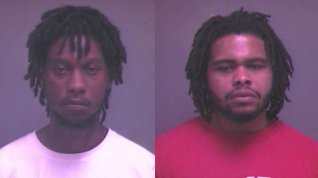A Robbery Turned Deadly

On August 3, 2011, at approximately 3:30 P.M., Kingsport Police Department (K.P.D.) patrol officers responded to a shooting at 937 Dale Street, Kingsport, Tennessee. They found Jarrett A. Hughes, a Black male, dead on the hallway floor with a gunshot wound to his back. Witnesses reported that two Black male suspects entered through the back door, shot Hughes, and fled. After a two-year investigation led by K.P.D. Sgt. Frank Light and Detective Randy Murray, involving over 60 interviews across East Tennessee and Southwest Virginia, Dominique Lashon Morrison (“Domo”) and Jarrod Logan Anderson (“Hoodie”), both from Johnson City, were identified as the perpetrators.
The investigation revealed that Morrison and Anderson, armed with a handgun, intended to rob Hughes. The situation escalated, resulting in Hughes being shot in the back. On August 13, 2013, the Sullivan County Grand Jury indicted them on charges of 1st Degree Felony Murder, Attempted Especially Aggravated Robbery, and Aggravated Assault. The following day, August 14, 2013, Kingsport detectives, with assistance from Johnson City Police, arrested the pair without incident. Interim Chief David Quillin praised the officers’ diligence, noting the arrests offered some closure to Hughes’ loved ones.
Drug Trafficking and Gun Violence in East Tennessee
While the official motive for Hughes’ murder was robbery, the circumstances—quick escalation, use of a firearm, and regional patterns—suggest a possible drug-related undercurrent, a common thread in East Tennessee’s violent crime. Sullivan County, with Kingsport as a hub, has a small Black population (around 3% in 2011 per U.S. Census data), yet Black individuals are disproportionately involved in gun violence, often tied to drug trafficking. Tennessee’s meth and marijuana trades, thriving in the region’s rural pockets, frequently intersect with firearms, fueling disputes that turn deadly, as seen here.
In 2011, East Tennessee was grappling with a surge in methamphetamine labs and marijuana distribution, often sourced from urban hubs like Johnson City or out-of-state. The Kingsport Police handled numerous drug busts that year, many escalating into violence. For example, a 2013 Bristol case saw a drug deal end in a shooting, while Knoxville’s 2007 Christian-Newsom murders (linked to your site) tied carjacking to a drug-fueled spree, killing two White students but reflecting the same volatile mix. In Kingsport, Black-on-Black shootings, though less frequent due to demographics, often mirrored urban patterns: robberies or turf disputes over drug profits, with guns as the equalizer.
Data from the Tennessee Bureau of Investigation (TBI) shows that in 2011, firearms were used in 67% of the state’s murders, with robbery and drug-related motives ranking high. Sullivan County’s Black community, despite its size, faced concentrated poverty and limited opportunity—conditions ripe for drug trade involvement. A 2014 Kingsport meth bust (your prior page) and this case illustrate how trafficking breeds violence: dealers arm themselves for protection, debts spark retribution, and bystanders like Hughes become targets. The result: a cycle where Black individuals, though a minority, disproportionately shoot each other over drug stakes in a region otherwise dominated by White populations.
Source: Kingsport Police Department, August 14, 2013.

